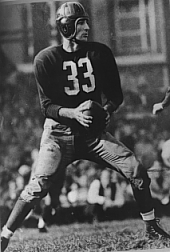I believe that NFL players should be well compensated for the punishment they put their bodies through. I believe they are entitled to a substantial chunk of the revenue that their dangerous labor produces. But I have long tired of the demand by NFL players and other pro athletes that they should be allowed to pursue whatever dollar amount they can get in the "free market."
The NFL is not a free market. No sports league is a free market. Never has been. And this has nothing to do with the structure of the collective bargaining agreement.
Say I own a muffler shop. If you're my competitor, you can lure my best installers away by paying them higher salaries. They may then go to work for you, in your shop -- but only in your shop. You can't send them to my shop to install mufflers in front of my customers.
Also, if you're my competitor in the muffler business, your aim is to run me and your other competition out of business. You don't need me to stay in business for you to continue installing mufflers.
And if you're a talented muffler installer, and you don't think you're getting paid enough by me or any other shop, then you can go down the street and start your own shop.
Let's contrast this with the NFL. League rules force me to bring my competitors into my establishment and forces my competitors to let me come into theirs. If the NFL were truly a free market, you couldn't force us to compete with you. I could just decide that I didn't want to play you. Maybe nobody would want to play you. After all, you took our best talent. And then what will all your spending have gotten you?
In the NFL, your aim in taking away my best talent is not to drive me out of business. Indeed, to ruin your competitors is to ruin yourself, because you'll have no one to play. Your team is worthless without mine and the others in the league. We are not separate businesses. We are divisions within the same business.
Finally, there are 32 teams in the NFL. Anyone is welcome to assemble their own pro football team, of course. But good luck trying to get anyone from the NFL to play you. The NFL is a closed economy.
Yes, if the NFL were truly a free market, there would be no salary cap, no franchise tag. But there would also be no union, no guaranteed minimums. Existing teams would be driven out of business, and new ones would be killed on the vine. There would thus be fewer teams, which means fewer jobs, which means greater competition among workers, which means lower salaries.
I write all this because of something I heard on Dan Patrick's radio show last week. Robert Smith, the former Vikings running back, said something I had never heard before. He said that nowhere in the collective bargaining agreement does it say NFL contracts cannot be guaranteed. If all contracts were guaranteed, he said, no one would get anything longer than a one-year contract, because it would be insane to sign a player to seven guaranteed years when he could blow out his knee next week.
Players want both guaranteed money and long-term deals, but owners will never, ever give them both. Ever. Let me say it again: Never. So you get the system we have now: Players get their signing bonus up front. That's their guaranteed money. (Listening, Maurice Clarett?) Hope they enjoy it. They also get a long-term deal, if that's important to them. But they can be cut whenever the team wants. That's the trade-off for the bonus.
Are there ways to a player could cut-proof his contract? Sure. I bet there are. But I doubt agents would be interested in pursuing that option, because it would mean less money up front. Better to keep making noise about the charade of the free market.
But whatever.
Subscribe to:
Post Comments (Atom)


No comments:
Post a Comment